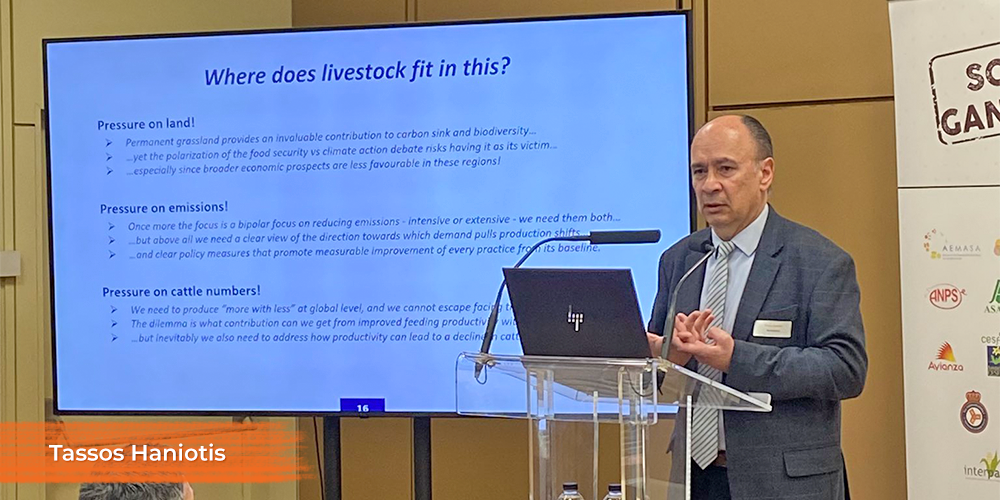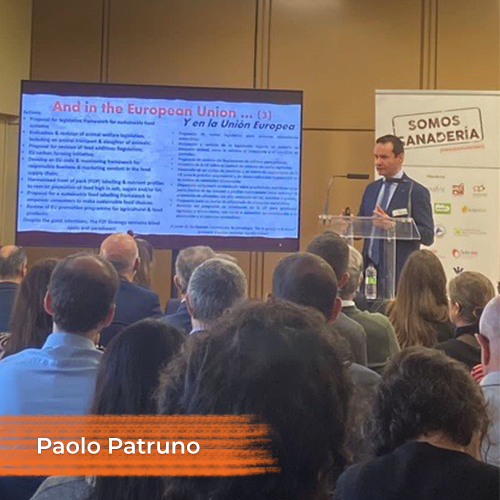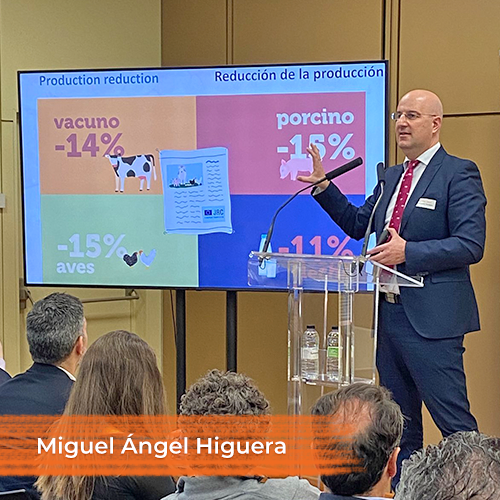Follow-up: Working together for more balanced views on European Livestock
Presentations from our event in Zaragoza can be accessed here:
Tassos Haniotis: Food market uncertainties and their impact on the livestock sector’s prospects
Paolo Patruno: The impact of the EU agenda on the livestock chain
Miguel-Angel Higuera: Views on the EU Green from a national (Spanish) level
Alice Stanton: Eat Lancet Planetary Diet & Global Burden of Disease
Event Press Release
Working together for more balanced views on European Livestock
30 March 2023, Zaragoza: Yesterday European Livestock Voice and the Spanish national platform Somos Ganaderia hosted an event in the auspices of the FIGAN agricultural fair in Zaragoza, Spain to discuss the current political, economic and societal challenges the livestock sector in Europe is facing today and the need for balanced debate.

Hosted by Brussels agri-journalist Natasha Foote, the event kicked off with opening remarks from the Deputy Director General for Livestock Production and Hunting from the Spanish Ministry of Agriculture, Fisheries and Food, José Luis Agüero. He highlighted some of the current challenges farmers are facing and said that the transformation of Europe’s food system needs to be inclusive, with no one left behind.
Keynote speaker Tassos Haniotis, a former Director of Strategy and Policy Analysis from the European Commission’s DG AGRI gave a rather stark presentation on current “Food market uncertainties and their impact on the livestock sector’s prospects”. The organising platforms European Livestock Voice and Somos Ganaderia followed his presentation, sharing European and national views on how policies under the EU Green Deal may impact the livestock value chain and the continued supply of food in Europe.

The second half of the morning was dedicated to a roundtable discussion on EU policies with scientists in the fields of nutrition, health, livestock sustainability and biodiversity.
Commenting on Europe’s calls for a shift in dietary patterns, Alice Stanton from the Royal College of Surgeons in Ireland said:
“Animal-sourced foods are nutrient-rich foods. Hence, it is of considerable importance that farmers and fishers produce dairy, meat, eggs and seafood ever more sustainably, and that consumption of these foods, in appropriate evidence-based quantities, continues to be included in national and international guidelines for a healthy, balanced diet. Scientists, policymakers and all involved in the production of food should be extremely wary of global health estimates that are not rigorously and transparently evidence-based, and/or that ignore the protections against nutritional deficiencies afforded by animal-sourced foods.”
Moving on to current debates about biodiversity loss and livestock farming, Pablo Manzano from the Basque Centre for Climate Change in Spain spoke about the important role herbivores like cattle and sheep play in maintaining a healthy ecosystem by preventing an overgrowth of vegetation. He commented:
“Grazing livestock is fundamental in preserving biodiversity, because it replaces the role that large wild herbivores have had during the last 15 million years in the world’s ecosystems.”
Concluding the exchange, Frédéric Leroy from the Brussels Vrije Universiteit in Belgium talked about the need for livestock systems to progress on the basis of the highest scientific standards, saying:
“The Dublin Declaration of Scientists (www.dublin-declaration.org) was issued in October 2022 and gives a voice to the many scientists around the world who are concerned about the mainstreaming of simplistic and reductionist views on the future of animal agriculture. It offers a defence of the many societal benefits of sustainable livestock and is calling to apply the highest standards of science. Currently, some 900 scientists have signed the Declaration.”
The event was attended by around 110 people from Spain, Brussels and across Europe. It served to reinforce the need for professionals from across the livestock value chain to unite and raise awareness throughout Europe, both of their efforts to further increase sustainability, and of the societal contributions of livestock. Ensuring that decision-makers at both EU and national level are informed of the evolving science and developments within the sector is crucial.


